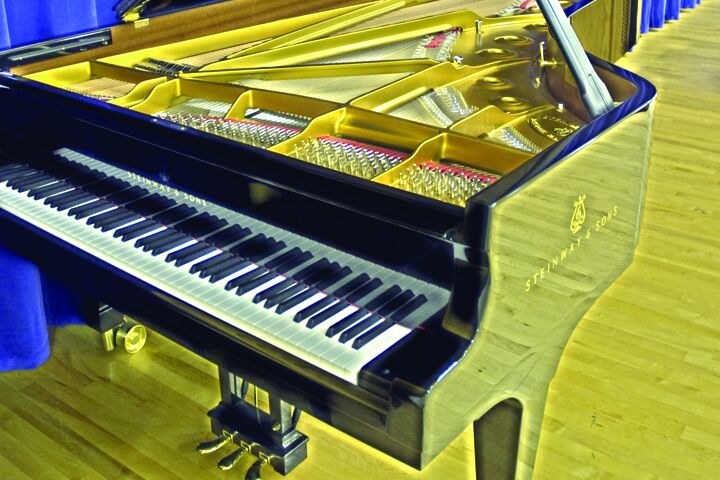
What Kind of Instrument Are You?
The room was full of dozens of the finest pianos in Europe. Mark Jenkins and I were there—at the Steinway and Sons factory in Hamburg, Germany—to inspect and select from the six concert grands lined up at the front of the room. We were looking for the most exquisite instrument we could find for the equally exquisite Armstrong Auditorium. With the international and long-standing reputation of the name Steinway, we knew we would find it.
After two hours of hopping from bench to bench and making furious comparisons and critiques, we were convinced we had found the perfect piano—the finest instrument in action, response, dynamic variety and sound that we had ever played. For the next hour and a half, we played every style of piece imaginable on the piano, to be sure that this indeed was the right instrument for the new hall.
Toward the end of the process, the head of Steinway’s concert artists division entered the room, and we told him how pleased we were with this particular piano. He succinctly stated what we were trying to describe: “Our goal is that the instrument you select acts as a mirror for the artist.” How perfectly expressed—everything we demanded of the instrument, the piano obliged perfectly. There was not a point where it would not allow us to go as quick, quiet, rough or relaxed as we wanted it to go. It was not a clunky “middleman” to the sound that we, as artists, wanted to make. It was a mirror.
Even those who do not play piano, or any musical instrument, can appreciate this. Most everyone uses instruments, or tools, of some form in their line of work. How do those instruments respond to you? Typically, those crafted with higher quality are more equipped to do exactly what we need them to do.
Is that not what God wants from us as His human instruments? “But in a great house there are not only vessels of gold and of silver … and some to honour, and some to dishonour. If a man therefore purge himself from these, he shall be a vessel unto honour, sanctified, and meet for the master’s use, and prepared unto every good work” (2 Timothy 2:20-21).
The Apostle Paul says that just as there are honorable instruments in a home, so too must we become honorable vessels, “meet for the master’s use.” We must be human instruments. Herbert W. Armstrong wrote in Mystery of the Ages that those called out of this world today will be the “instruments God shall use” to bring the world to salvation. The English word instrument is defined as “a means whereby something is achieved, performed, or furthered” (Merriam-Webster’s Collegiate Dictionary).
What kind of instruments are we? God is the Master, and we have to yield ourselves to His use.
When God is trying us out as an instrument, what response is He getting? Would He say, Everything I do, this person responds exactly the way I want him to! He is a mirror to all the effort and mastery I am putting into him! Perhaps more commonly it is: I try to play this instrument this way, and yet there are places where it doesn’t respond the way I need it to.
At the end of our meeting with Steinway, the representative handed us a chart showing an aerial view of a full keyboard, and asked us to circle the areas on the piano where the action or regulation could be improved—perhaps a register of the piano that sounded duller or thinner than other areas of the keyboard. Mr. Jenkins, the colleague with me in this selection process, looked at me, and we both said aloud: “Don’t change a thing.”
The instrument, like those honorable vessels Paul wrote of, was “prepared unto every good work.” There was not one area of the instrument that we felt was lacking in power, or that stood out as inconsistent in sound from the other parts of the piano. We know the piano did not start that way. It took a full year (not including the two years that the wood sat in Steinway’s lumber warehouse) to construct that piano. It went through many painstaking quality-control checkpoints. Likewise, through an arduous process of inspections and tests, God intends for us to be growing as instruments who will perfectly reflect His will—not be an awkward “middleman” between God’s will and the actual lesser result.
Paul also uses this metaphor to describe our relationship with God in Romans 6: “Neither yield ye your members as instruments of unrighteousness unto sin: but yield yourselves unto God, as those that are alive from the dead, and your members as instruments of righteousness unto God” (verse 13).
Unlike a piano, we have the ability to question God or refuse to play what He wants us to play. The key to being a perfect instrument for God, therefore, is about yielding.
Another definition of instrument is “one used by another as a means or aid” (ibid.). We must yield to God’s use.
Romans 9:20 asks: “… Shall the thing formed say to him that formed it, Why hast thou made me thus?”
A musical instrument will do exactly what the human performer puts into it, even the mistakes. The inanimate piano doesn’t know how the piece is supposed to be played, so it cannot question the performer. It simply allows the mistakes.
God, the real Master, makes no mistakes. His will and execution of His will is perfect. Our job is to be the mirror to that will.
Verse 21 says: “Hath not the potter power over the clay, of the same lump to make one vessel unto honour, and another unto dishonour?”
God is molding us into the finest instruments, the most honorable vessels, this universe has ever seen. Each day, let us grow closer to becoming that perfect mirror of God’s masterful will!
